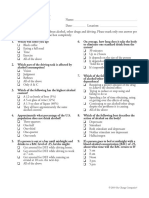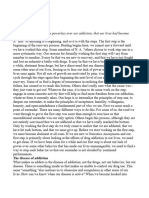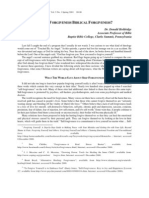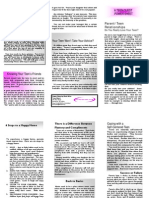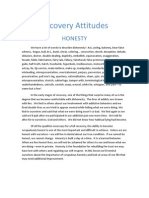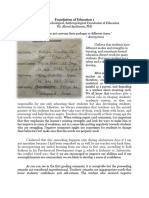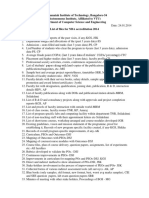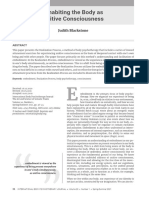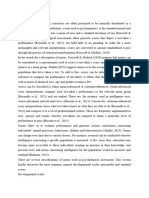Did Someone Hurt You? Are You Angry? Holding A Grudge? Forgiveness Therapy
Did Someone Hurt You? Are You Angry? Holding A Grudge? Forgiveness Therapy
Uploaded by
Ruli Insani AdhityaCopyright:
Available Formats
Did Someone Hurt You? Are You Angry? Holding A Grudge? Forgiveness Therapy
Did Someone Hurt You? Are You Angry? Holding A Grudge? Forgiveness Therapy
Uploaded by
Ruli Insani AdhityaOriginal Title
Copyright
Available Formats
Share this document
Did you find this document useful?
Is this content inappropriate?
Copyright:
Available Formats
Did Someone Hurt You? Are You Angry? Holding A Grudge? Forgiveness Therapy
Did Someone Hurt You? Are You Angry? Holding A Grudge? Forgiveness Therapy
Uploaded by
Ruli Insani AdhityaCopyright:
Available Formats
DID SOMEONE HURT YOU? ARE YOU ANGRY? HOLDING A GRUDGE?
FORGIVENESS THERAPY
DEFINITION OF INTERPERSONAL FORGIVENESS Interpersonal forgiveness, the definition drawn from North (1987), is the overcoming of negative affect/emotions and judgment toward the offender, not by denying ourselves the right to such affect and judgment, but by endeavoring to view the offender with benevolence, compassion, and love, while recognizing that he or she has abandoned the right to them (p.126-127). Enright and The Human Development Study Groups (1991) basic assumption is that interpersonal forgiveness is a process and is a moral response. This process of how a person goes about forgiving another involves a series of strategies which include cognitive, affective, and behavioral components. WHAT INTERPERSONAL FORGIVENESS IS 1. 2. 3. 4. 5. 6. 7. 8. 9. 10. 11. 12. 13. 14. 15. Forgiveness is person centered. Forgiveness is a process. Forgiveness is on a continuum. Forgiveness is superficial or deep. Forgiveness is unstable or stable. The quality of forgiveness may be dependent on various factors. The quality of the wrong may vary. The depth of the wrong may vary. The wrong is objective, not subjective. The expression of forgiveness will vary by culture and religion. The expression of forgiveness may be cognitive, emotional, spiritual and/or behavioral. Who is the offended and offender is not always clear. The offender does not have to apologize to be forgiven. The offender need not have intended to hurt. Under some circumstances, one can be deeply hurt by well-intended people who do not mean to harm. One usually trusts the other when re-entering into a relationship. However, in cases of continual and chronic abuse, one can forgive the other without trust in that area and without reconciling with the offender. The forgiver perceives the other as a human being and realistically acknowledges his/her weaknesses in that area. Forgiveness can be transformational for oneself and others. Because of the love and compassion that is extended, forgiveness can restore the relationship and make it stronger. Forgiveness is a choice and not be forced onto anyone. It is a gift that is freely given.
16. 17.
WHAT INTERPERSONAL FORGIVENESS IS NOT 1. 2. 3. 4. 5. 6. 7. 8. 9. 10. 11. 12. 13. 14. 15. 16. 17. 18. VI. Forgetting. Reconciliation. Condoning and excusing. Pardon, legal mercy or leniency. Justification: believing what the person did was fair. Balancing scales. Self-centered. Letting time heal the wound. Abandoning resentment. Possessing positive feelings. Saying I forgive you. Making a decision to forgive. Forgiveness is a quick fix. Ive accepted what happened I have moved on. I have the satisfaction of not letting the person get to me. This may be cloaked revenge. I accept what happened knowing that God will punish him or her. This could be cloaked revenge. I like to let the person know how much he or she owes me. This may be a form of cloaked revenge. GOALS OF THE PHASES OF INTERPERSONAL FORGIVENESS Phase Uncoveri ng Goal The goal is for the patient to have a better understanding of how the injustice and their reaction to it have affected their psychological health. Decision The goal is for the patient to gain an accurate understanding of what forgiveness is and is not and to make a decision and commitment to forgive. Work The goal is for the patient to gain a cognitive understanding of the offender and to begin to view the offender in a new light. This understanding results in a positive change in affect about the offender, about his or her self, and about the relationship. Deepeni The goal is for the patient to find meaning in their suffering, ng to feel more connected with others, and to experience a decrease in negative affect and possibly a renewed purpose in life. Adapted from Enright & Fitzgibbons, (2000, pg. 67)
You might also like
- Reality Vs Expectations: Step 1 - Improve My Reality Step 2 - Lower My ExpectationsDocument1 pageReality Vs Expectations: Step 1 - Improve My Reality Step 2 - Lower My Expectationsannie5sunshineNo ratings yet
- Letter of Self-ForgivenessDocument2 pagesLetter of Self-ForgivenessMinyak KatsuriNo ratings yet
- Case Formulation NadinDocument8 pagesCase Formulation NadinNashwa ElAraby100% (1)
- Pre Post TestDocument4 pagesPre Post TestRain0% (1)
- Self-Esteem: by Jean Kirkpatrick, PH.D., WFS FounderDocument5 pagesSelf-Esteem: by Jean Kirkpatrick, PH.D., WFS Foundertmaha87No ratings yet
- Self-Care AssesmentDocument2 pagesSelf-Care Assesmentapi-337514528No ratings yet
- REACH - Forgiveness Model - Everett WorthingtonDocument4 pagesREACH - Forgiveness Model - Everett WorthingtonJohn Loppnow100% (4)
- When We Love Too Much Escaping The Control of Codependency PDFDocument33 pagesWhen We Love Too Much Escaping The Control of Codependency PDFmugiwaraNo ratings yet
- How To Forgive Yourself 4583819 PDFDocument6 pagesHow To Forgive Yourself 4583819 PDFsarah adrianaNo ratings yet
- Dokumen - Pub - 12 Essential Insights For Emotional Sobriety Getting Your Recovery Unstuck 12 Series 9781955415125 1955415129Document284 pagesDokumen - Pub - 12 Essential Insights For Emotional Sobriety Getting Your Recovery Unstuck 12 Series 9781955415125 1955415129kruithof100% (1)
- STEP 7 Celebrate RecoveryDocument1 pageSTEP 7 Celebrate RecoveryMônica MottaNo ratings yet
- Hs Counseling Intake FormDocument4 pagesHs Counseling Intake FormPaul AbellanozaNo ratings yet
- What Is Emotional WellnessDocument4 pagesWhat Is Emotional WellnessRichard BryanNo ratings yet
- Forgiveness As A Cure For Resentment RacketsDocument3 pagesForgiveness As A Cure For Resentment RacketsNarcis NagyNo ratings yet
- Reality Therapy/ Choice Therapy: By: Bea Audine Toledo Mary Joy Pepa Syra FajardoDocument14 pagesReality Therapy/ Choice Therapy: By: Bea Audine Toledo Mary Joy Pepa Syra FajardoLj Mendoza100% (2)
- Unconditional Forgiveness by Mary Hayes Grieco - CH 1Document35 pagesUnconditional Forgiveness by Mary Hayes Grieco - CH 1Beyond Words Publishing100% (4)
- Reality TherapyDocument29 pagesReality Therapycass yerrowNo ratings yet
- Identity in Coaching Worksheets: The Expensive PerfumeDocument4 pagesIdentity in Coaching Worksheets: The Expensive PerfumePoliteNo ratings yet
- Coping MechanismsDocument3 pagesCoping MechanismsSani100% (1)
- Guide To Working The Twelve StepsDocument18 pagesGuide To Working The Twelve StepsScribdTranslationsNo ratings yet
- Games and Exercises For Couples TherapyDocument4 pagesGames and Exercises For Couples TherapyScribdTranslationsNo ratings yet
- Couple Therapy Forgiveness As An Islamic Approach in CounsellingDocument6 pagesCouple Therapy Forgiveness As An Islamic Approach in CounsellingOkta NopriansyahNo ratings yet
- Rewired+ +10+Elements+to+RecoveryDocument9 pagesRewired+ +10+Elements+to+Recoverysouvenirtje16No ratings yet
- Difference Between Emotions and FeelingsDocument5 pagesDifference Between Emotions and FeelingsConstanta Cobuscean100% (1)
- Questions On AADocument5 pagesQuestions On AACedric MonroyNo ratings yet
- Common Questions Counselors Often AskDocument3 pagesCommon Questions Counselors Often Askngelver rafalNo ratings yet
- Self Forgiveness HoldridgeDocument5 pagesSelf Forgiveness Holdridgeclou321dNo ratings yet
- Twelve-Step Programs Addiction RecoveryDocument6 pagesTwelve-Step Programs Addiction RecoveryDwi PascawitasariNo ratings yet
- A Mindfulness Based RebtDocument13 pagesA Mindfulness Based RebtmentationNo ratings yet
- How To Stop Ruminating 10 Tips To Stop Repetitiv 2Document2 pagesHow To Stop Ruminating 10 Tips To Stop Repetitiv 2Swarnali BoseNo ratings yet
- Dvs Teen Program Curriculum 2012Document14 pagesDvs Teen Program Curriculum 2012api-124277777100% (1)
- Self EsteemDocument13 pagesSelf Esteemiulia9gavrisNo ratings yet
- What Is Reality Therapy A DunneDocument2 pagesWhat Is Reality Therapy A DunneFarsiana Aji PuspitasariNo ratings yet
- Celebrate Recovery Lesson 1 - Denial (Free Study Guide) - Sharing Life and LoveDocument12 pagesCelebrate Recovery Lesson 1 - Denial (Free Study Guide) - Sharing Life and LoveKim-Rushay Williams0% (1)
- PERSONAL RELATIONSHIP BookDocument52 pagesPERSONAL RELATIONSHIP BookQueenie PaduaNo ratings yet
- Attachment TheoryDocument13 pagesAttachment Theorysumit ahujaNo ratings yet
- Understanding Emotional SobrietyDocument3 pagesUnderstanding Emotional SobrietyMy Lane100% (1)
- Parent and Teen RelationshipsDocument2 pagesParent and Teen Relationshipsdbrown1288No ratings yet
- Relationship MaintenanceDocument9 pagesRelationship Maintenance1105195794No ratings yet
- What is Ketamine Therapy_ - Homewood Health CentreDocument8 pagesWhat is Ketamine Therapy_ - Homewood Health CentreJully KuriaNo ratings yet
- Rebt - A Powerful Tool For Depression: by DR Sabeela SajidDocument16 pagesRebt - A Powerful Tool For Depression: by DR Sabeela SajidSabeela SajidNo ratings yet
- College Anxiety: How To Help An Anxious Student Transition SuccessfullyDocument5 pagesCollege Anxiety: How To Help An Anxious Student Transition SuccessfullybelbachirNo ratings yet
- Marriage CounsellingDocument1 pageMarriage Counsellingafiffarhan2No ratings yet
- Lesson 2 UNDERSTANDING THE SELFDocument3 pagesLesson 2 UNDERSTANDING THE SELFAorrie100% (1)
- Story: Honesty Makes Us FragrantDocument3 pagesStory: Honesty Makes Us FragrantAshwini TelangNo ratings yet
- Action PLanning Pitstop SELDocument2 pagesAction PLanning Pitstop SELSven LungNo ratings yet
- Couples Therapy: The Relationship As The ClientDocument11 pagesCouples Therapy: The Relationship As The ClientAnonymous Ax12P2srNo ratings yet
- Celebrating My Family's Love LanguagesDocument2 pagesCelebrating My Family's Love LanguagesGaspar CalunaNo ratings yet
- Recovery Attitudes Honesty PDFDocument3 pagesRecovery Attitudes Honesty PDFDavid LowryNo ratings yet
- CBT WorkbookDocument5 pagesCBT WorkbookninoNo ratings yet
- Enabling - An Overused IdeaDocument4 pagesEnabling - An Overused IdeaThe Center for Motivation and ChangeNo ratings yet
- Chapter 10 Reality TherapyDocument28 pagesChapter 10 Reality TherapyDonna Alejo100% (1)
- Moral Injury WorkbookDocument20 pagesMoral Injury WorkbookKhurram Abbasi100% (3)
- Introduction To Inner ChildDocument39 pagesIntroduction To Inner ChildLaura Gabriela Mocanu100% (1)
- Self Compassion Handout Bereavement Group 2 2016Document6 pagesSelf Compassion Handout Bereavement Group 2 2016PrateekGandhiNo ratings yet
- 4 Gen Holiday TipsDocument2 pages4 Gen Holiday TipsmelodyfathiNo ratings yet
- Control Your Anger With Positive AffirmationDocument2 pagesControl Your Anger With Positive AffirmationNhor Halil QuibelNo ratings yet
- Sensate Focus EjerciciosDocument2 pagesSensate Focus EjerciciosMarcelo Da Silva0% (1)
- How To Use Worry TimeDocument2 pagesHow To Use Worry TimeKaviNo ratings yet
- Indian Institute of Management Indore Post-Graduation Programme in ManagementDocument4 pagesIndian Institute of Management Indore Post-Graduation Programme in ManagementPamona DevaNo ratings yet
- Q1 Grade 7 Music DLL Week 2Document7 pagesQ1 Grade 7 Music DLL Week 2axus ayam100% (3)
- Solution-Focused Art TherapyDocument142 pagesSolution-Focused Art TherapyMirela Cojocaru StetcoNo ratings yet
- Influence of Intelligence and Gender On Academic ADocument7 pagesInfluence of Intelligence and Gender On Academic ADaniela DiaconuNo ratings yet
- Depression Journal PDFDocument24 pagesDepression Journal PDFRoses MaamoNo ratings yet
- NEWasa Growing - Up Teen Final RevDocument4 pagesNEWasa Growing - Up Teen Final RevCeleste6No ratings yet
- Makalah PragmaticsDocument7 pagesMakalah PragmaticsAraNo ratings yet
- Self Development (ACAH6)Document6 pagesSelf Development (ACAH6)chanderpalkumar184No ratings yet
- Inner Engineering Online (IEO) Intervention With Harvard Medical For S2Tech - Old PDFDocument1 pageInner Engineering Online (IEO) Intervention With Harvard Medical For S2Tech - Old PDFJNo ratings yet
- Material Development - Expressing Compliment and SympathyDocument14 pagesMaterial Development - Expressing Compliment and SympathyKadek Mas Rika Kusumadewi Undiksha 2019No ratings yet
- Relational FreedomDocument29 pagesRelational FreedomedibuduNo ratings yet
- Classwork About Teacher's RemarksDocument2 pagesClasswork About Teacher's RemarksJesibel Loresto LequilloNo ratings yet
- IepDocument26 pagesIepapi-326610254No ratings yet
- Speech EnglishDocument3 pagesSpeech Englishdiana iis100% (1)
- NBA Work Allotment-1Document2 pagesNBA Work Allotment-1Nidhyananth DNo ratings yet
- Understanding The Self 1Document19 pagesUnderstanding The Self 1Diane Ramento100% (4)
- G H Raisoni University: Report of One-Day E-Intellectual Property RightsDocument12 pagesG H Raisoni University: Report of One-Day E-Intellectual Property Rightsanoop vishwakarmaNo ratings yet
- Year 4 Lesson Plan (Listening) : AttendanceDocument5 pagesYear 4 Lesson Plan (Listening) : AttendanceAnonymous BOX3A3eNo ratings yet
- Success Criteria: Pupils Can: Cce / EeDocument7 pagesSuccess Criteria: Pupils Can: Cce / EeKesavarrtiny SinnasamyNo ratings yet
- Bte2601 Assignment Number 2 (1) EditedDocument4 pagesBte2601 Assignment Number 2 (1) EditedYolandaNo ratings yet
- Leading: Lobos, Rodrigo Jr. B. Bsce-3ADocument10 pagesLeading: Lobos, Rodrigo Jr. B. Bsce-3AErrol EstayanNo ratings yet
- Inhabiting The Body As Unitive Consciousness Judith BlackstoneDocument10 pagesInhabiting The Body As Unitive Consciousness Judith Blackstoneshambala1No ratings yet
- NormsDocument3 pagesNormsfarhaanah.abdullah02No ratings yet
- A Clinical ApproachDocument20 pagesA Clinical ApproachNur Ainatun NadrahNo ratings yet
- Management Positions Powerpoint Aeb 2016Document17 pagesManagement Positions Powerpoint Aeb 2016api-332572338No ratings yet
- Outline of Business Communication MBADocument1 pageOutline of Business Communication MBAadiba10mktNo ratings yet
- Stci T30Document2 pagesStci T30Muhammad MussawarNo ratings yet
- When Rain Clouds Gather ENG1501Document13 pagesWhen Rain Clouds Gather ENG1501BeNobody2No ratings yet
- Study File 8Document19 pagesStudy File 8Leones JessiejuneNo ratings yet
- Week: Moral Values: Date: / /2018 Class:: Lesson OutlineDocument2 pagesWeek: Moral Values: Date: / /2018 Class:: Lesson OutlinejessvinjoanneNo ratings yet



